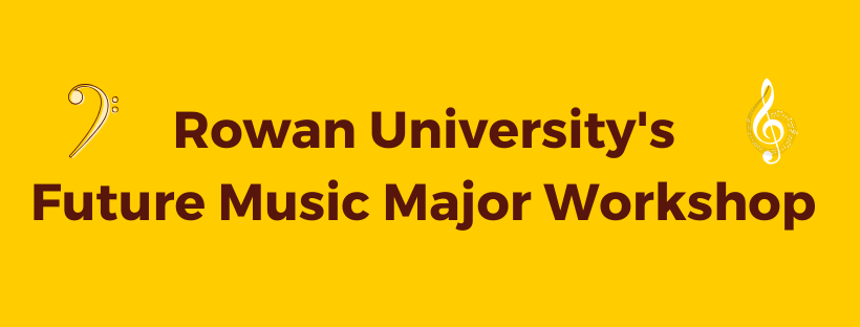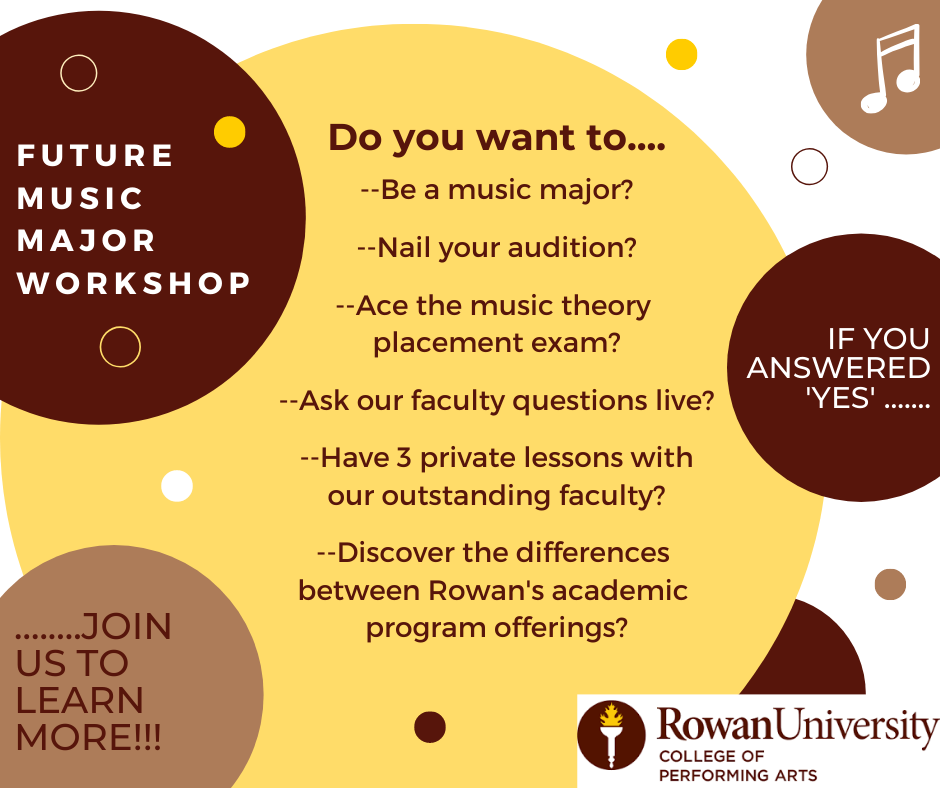Future Music Major Workshop
Future Music Major Workshop


Included:
-
Three, 45 minute Live Online Lessons (all students pre-select 3 topics with 1 instructor for lessons prior to the Workshop).
-
Voice students are able to select 3 lessons with 1 voice professor or 1 lesson with each of the 3 professors.
-
Violin & Viola lessons have a capped enrollment of 3 students total (only 1 space remaining open) with Dr. Timothy Schwarz. Lessons with Dr. Timothy Schwarz will be determined by audition only and we will honor paid registrations in the order they are received. All Violin and Viola students should send a short audition video to both of the following email addresses: Schwarzt@rowan.edu and musiccamps@rowan.edu including two scales and a prepared solo piece of your choice no later than July 1, 2020.
-
Lesson Absence Policy:
- If the instructor cancels a lesson:
- These lessons will be rescheduled at the convenience of both the professor and the student between August 3-7, 2020.
- If the student cancels the lesson:
- Absences are only considered excused if the professor and Rowan Future Music Major Workshop Coordinators are notified 24 hours before the lesson.
- Students are allowed one excused absence during the Workshop.
- The make-up lesson for one excused absence will be rescheduled at the convenience of the professor.
- An excused absence not made up within the Workshop (August 3-7, 2020) will be forfeited.
- If the make-up lesson is cancelled by the student, the lesson shall be considered made up.
- Unexcused absences will not be made up.
- If the instructor cancels a lesson:
-
Sessions
1. Greetings & Welcome! Presenter: Dr. Rick Dammers; Dean - College of Performing Arts
2. Wilson Hall (Music Building) Virtual Tour & Meet our current students!3. Meet the The Rowan University Music Alumni!
4. Introduction into the Rowan University Music Therapy Program! Presenter: Dr. Andrea Hunt
5. Developing Your Pre-Music Major Toolkit. Presenter: Professor Joe Akinskas
Description: Potential Music Majors should be thinking about their entry into musical academia well before their audition preparation and entry process. This session will provide you with several focus elements to assist in preparing for a successful collegiate career and beyond….right now!!
6. How to be a Better Brass Player! Presenter: Dr. Bryan Appleby-Wineberg
Description: Intonation and sound development, so you can lead your section!
7. Preparing For Your College Percussion Audition. Presenter: Dr. Fabio Oliveira
8. Nailing That First Music Major Audition! Presenters: Rowan University Faculty Panel
9. Why Study Western Music History? Presenter: Dr. Davide Ceriani
Description: During their future careers, music majors will have the chance to work as performers, educators, producers, and more. Time to devote themselves to explore the deep historical background of every piece they come across will likely shrink in their adult life, so it is crucial that they encounter a wide range of music during college, as well as to an overarching framework where they can fit each new piece they encounter and critically engage with scholarly readings. A survey of Western music history offers that framework, as well as the opportunity to compare a student’s view with that of her or his peers.
10. An Introduction to Conducting. Presenters: Dr. Joseph Higgins & Dr. Christopher Thomas
Description: Whether you are an experienced high school drum major or have never conducted before, this session is an interactive introduction to basic conducting skills. Dr. Higgins (instrumental) and Dr. Thomas (vocal) will share fun and useful exercises for the beginning conducting student.
11. Succeeding in Music Theory Classes & Brushing Up for the Music Theory Placement Test. Presenter: Dr. Adam Kolek
Description: Get the details on the level of preparation expected for first-year of music theory and what to work on before going to college. Students will be given the music theory placement test to take before this session. Dr. Kolek will discuss questions on the typical test and review questions in which students had difficulty.
12. Ensemble Excellence! Presenters: Dr. Joseph Higgins & Dr. Christopher Thomas
Description: Dr. Higgins (instrumental) and Dr. Thomas (choral) discuss college-level ensembles. They will share how student-musicians are expected to prepare, show examples of various concert programs and themes, and describe how one's experience in college ensembles differs from High School or honor-ensemble experiences.
13. Why a Career in Music Education? Presenters: Dr. Adrian Barnes & Dr. Vanessa Bond
14. Music Education; Nuts & Bolts: What to Expect in College & After. Presenter: Dr. Joanne Erwin
Description: This session will look into the general expectation and perspective of the courses in the Music Education major regardless of performance focus. Career options will be disccused and Dr. Erwin will describe the variety of work that people do with the skills that are learned in the Music Education major. It is not just teaching in public school, but that is a great choice!
15. Presenting Your Best Vocal Audition. Presenters: Professor Marian Stieber, Dr. Christopher Thomas, Professor Lauren Athey-Janka and Professor Colin Levin
16. The Collegiate Choral Experience. Presenter: Dr. Christopher Thomas
Description: In this session we will take a deep dive into the world of choral singing at the collegiate level. We'll talk repertoire, concepts, techniques, goals, and performance opportunities. We will listen, explore, and discuss what YOU will likely be doing as a collegiate choral singer.
17. Let's Talk Choral Music! Presenter: Dr. Christopher Thomas
Description: Ever wondered what pieces of music are considered some of the very best choral pieces? What should be on your summer listening list, and what makes the music so important or universally celebrated? After we take a look back, we'll try to glimpse where trends and techniques will transform our music throughout the decade.
Schedule
Click here to view the schedule. Stay tuned to our website for all schedule updates!
Lesson Faculty & Topics
Voice - Professors: Marian Stieber, Lauren Athey-Janka, Colin Levin
1. Vocal Technique for the Solo VoiceGain the skills necessary to become a better singer! Students will study posture, breath management and support, explore vocal health and discover how to enhance the many amazing facets of the voice! Students will learn through exercises, vocalises, and repertoire in addition to learning how to keep the voice healthy. Come discover your voice with us!
2. Singing with Clear Diction as a Soloist
Let your audience hear every word you say! Discover techniques to articulate consonants and vowels in a lyric and natural production. Following this session you will feel empowered to deliver your vocal message!
3. Expressing the Drama of your Text
Learn the skills required to feel confident when singing on stage! Students will learn how to examine the text in a song so you can fully engage and connect with an audience. The faculty will also teach you how to use expression as well as gesture to convey emotion no matter the language. We are excited for you to come join us and see you become a fearless performer!
Flute - Professor Susanna Lowey
- Mastering the Flute, One Exercise at a Time
- Show Off Your Sound: The Long Tones Trifecta
- Self Talk: Improving Focus and Calm While Playing
- Double Tonguing: Daily Pieces for Articulation Control
- Orchestral Excerpts, Etudes, and Pieces: Steps to Learn Music Thoroughly
Oboe - Dr. Mark Snyder
- Basic instrument maintenance and simple fixes for temperamental reeds
- Sight reading with ease
- Performing scales with musical intention
- Optimal audition/solo preparation
- Breath support and articulation
- Intonation and dynamics
Clarinet - Dr. Rie Suzuki
- The Embouchure: Understanding the Concept and Exercises to Establish a Solid Embouchure
- Breathing and Phrasing: The Importance of Understanding Respiratory Function
- Tone Quality and Intonation: Voicing and Listening
- Let's Talk About Tonguing: Regular or Anchor or Something Else?
- Understanding Reeds: How to Select and Adjust
- Building a Solid Technique: Hand Position, Finger Movement, and the Importance of Slow Practice
- Establishing Good Practice Habits: Starting with One-Hour Practice and Beyond
- How to Improve Sight-Reading Skills: Pattern Recognition and Memorization
- Audition Repertoire for Clarinet: Effective Selection for College Auditions
Saxophone - Dr. Noa Even
- Developing a good warm-up routine
- Forming artistic and personal interpretations
- Practicing scales with expressive intent
- Honing stylistic articulation
- Refining tone and intonation with overtone exercises
- Solidifying and retaining technical passages
- Establishing a solid embouchure
- Developing strong sense of pulse and rhythmic accuracy
- Preparing for a college audition
Jazz (Any instrument) - Professor Denis DiBlasio
- How to solo on one scale.
- Which jazz tunes should I learn first?
- How do I start transcribing?
- How do I work on articulation in Jazz?
- What exercises should I do for tone?
- What songs can I use one scale to solo over?
- How do I develop fast, clean technique?
- What are different approaches for using the time
- How can I create using just 4 notes?
- How do you use Pentatonics in improvisation?
Jazz Guitar - Professor Brian Betz
- Chord and scale workout.
- Playing over the blues.
- Introduction to jazz guitar!
Bassoon - Professor Zachary Feingold
- Developing and memorizing appropriate and effective warm-up routines
- Reeds
- What is expected in the private lesson and how to successfully prepare for them on a weekly basis
- Repertoire (orchestral, solo, chamber, etc.)
Trumpet - Dr. Bryan Appleby-Wineberg
- Practice Techniques
- Rhythm and Metronome
- Range
- Endurance
- Embouchure Development/Change
- Flexibility
Horn - TBA
Trombone - Professor Rick Linn
- Preparing for a college audition.
Euphonium - Dr. Amy Bliss
Tuba - Professor Brian Brown
Guitar - Professor Joseph Mayes
Violin & Viola - Dr. Timothy Schwarz (Capped enrollment of 3 students, only 1 remains. Lessons with Dr. Timothy Schwarz will be determined by audition only and we will honor paid registrations in the order they are received. All Violin and Viola students should send a short audition video to both of the following email addresses: Schwarzt@rowan.edu and musiccamps@rowan.edu including two scales and a prepared solo piece of your choice no later than July 1, 2020)
- Tone Production for Violinists or Violists - This lesson goes over the fundamentals of tone production, and delves into how to gain greater freedom and expressiveness in your bow arm.
- How to practice chords in Solo Bach: A sesion for highly advanced violinists - Students should have at least one movement from the Six Sonatas and Partitas for solo violin by Bach prepared for this seminar. The movement must contain chords, such as a fugue, sarabande, or chaconne.
- Basic Practice Techniques for Violin or Viola - Ever feel like you should be making more progress than you should? this session helps you organize your practice time, and identify how to practice in an effective way.
Violin - Dr. Elizabeth Guerriero
Cello - Dr. Joanne Erwin
- Freedom in action for producing the most tone for cellists.
- Freedom in action for reliable pitch location including shifting for cellists.
- Developing musical vibrato for cellists.
Double Bass - Professor Douglas Mapp
- Improve your walking bass lines.
- String Bass 101: A lesson on the basics.
- Improve your tone with the bow.
- Improve your shifting.
- Introduction to jazz soloing.
Percussion - Dr. Fabio Oliveira
- Developing a daily snare-drum practice routine.
- Snare-drum lesson: personal repertoire and audition preparation.
- Developing a daily practice routine for two-and four-mallet playing.
- Marimba lesson: personal repertoire and audition preparation.
- Timpani lesson: sound, strokes, sticks, personal repertoire and audition preparation.
- Student directed topic and repertoire: feedback on projects and pieces in preparation.
Jazz Vibraphone - Professor Behn Gillece
Drum Set - Professor Dan Monaghan
